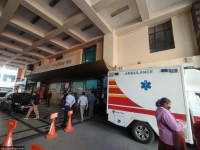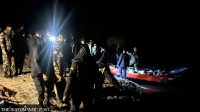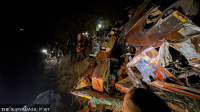National
Government extends Kathmandu-Tarai expressway deadline to 2024
Nepal Army, which is in charge of the national pride project, hints at use force if there is trouble in land acquisition in Khokana area..JPG&w=900&height=601)
The government has extended the deadline for Kathmandu-Tarai expressway by more than two years, pushing the completion date to February 2024. The detailed project report, which states the project will be completed within four and a half years from the day of its approval, was endorsed by the Cabinet on August 18.
When the national pride project was handed over to the Nepal Army in August 2017, the government had set August 2021 deadline. But even two years since the start of the construction, the national defence force has hardly completed eight percent of the work.
“Though the project report had given four and a half years, we are committed to completing the project in the next three and a half years,” Brigadier General Bigyan Dev Pandey, spokesperson for the Army, told the media on Wednesday. “As the project report has already been approved, we will now expedite the construction.”
The project report of the 72.5-km road, which will link Kathmandu with Nijgadh of Bara, was tabled in the Cabinet for approval in the third week of March. The Korea-based Soosung Engineering and Consulting had prepared the detailed project report.
The Cabinet, however, took five months to approve the report due to the escalated cost. The detailed report has estimated the project cost at Rs213 billion—Rs80 billion more than what was projected by an Indian consortium of Infrastructure Leasing and Financial Services Transportation Networks, IL&FS Engineering and Construction, and Suryavir Infrastructure Construction in 2015.
The detailed project report by the Indian firm had estimated the construction cost at Rs133.70 billion ($1.12 billion at the current exchange rate) if it were to be built with a soft loan. The cost would have increased if it was a commercial loan.
After the detailed project report was submitted, the government had sought justification from the Army about the increased cost. Now, the final cost has been revised to Rs175 billion, excluding the contingency expenses.
“The contingency cost now has been deducted, leading to a decrease in the final cost,” said Pandey.
The government has given the green signal to make Khokana the entry point of the much-hyped expressway after the alignment was revised to protect cultural sites, including the Shikali temple. With the new alignment, the expressway will not affect areas of cultural and religious importance, according to the Army.
A section of the residents from Khokana had been demanding that the government change the entry point to Pharsidol from their locality. The process for acquisition of around 78 ropanis of the land in Khokana has failed to move forward due to objection from the locals.
“They mainly want an increment in the compensation amount. We have already recommended that the government address their concerns,” said an Army officer on condition of anonymity because he was not allowed to speak to the media. “We might have to take local administration’s support if the issue could not be resolved even after increasing the compensation, as the acquisition process must be completed in a year.”
The Army has already spent Rs14 billion in the last two years. The government has allocated Rs15 billion in the current fiscal year for the four-lane project.
The expressway, which will reduce the travel time between Kathmandu and the Tarai to around an hour, will have three tunnels and 87 bridges, according to the detailed project report.
According to the Army, international contractors will be needed for the construction of 16 of the total bridges, as they are complex in nature. The Army has shortlisted six companies—five Chinese and one Turkish—for the construction of the bridges and it is preparing to invite interested international companies for the construction of tunnels.
The Kathmandu-Nijgadh expressway was first conceptualised in the mid-1990s. But it failed to take off for almost a decade and a half. The government revived the project in 2013 and two years later, the Indian consortium won the bid for the project—in February 2015. But in October the same year, the Supreme Court ordered a halt to the preparations to award the project to the Indian developer. A year later, in December 2016, the government cancelled all agreements made with the Indian company to build the expressway. The government had decided to award the project to the Nepal Army in the first week of May 2017
“The Army and domestic and international construction companies will work jointly to complete the expressway on time,” said Brigadier General Sarad Lal Shrestha, head of the project.




 22.9°C Kathmandu
22.9°C Kathmandu













